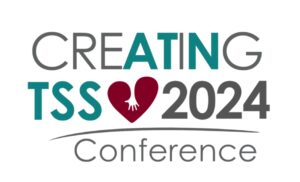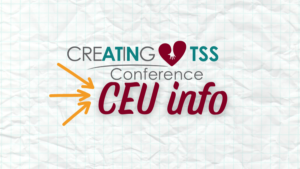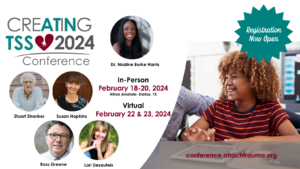
Call for Presentations
TSS2024 Conference
Proposal Deadline: June 30, 2023
Conference Dates: February 18-20, 2024
In-person Portion: Feb 18-20, 2024 – Hilton Anatole, Dallas, TX
Virtual Portion: TBD
TO SUBMIT: Read through this page and go to the link at the bottom. Choose one email address to use throughout the entire submission process and the conference. Your submission tracking/conference platform access will be via your chosen email. Your resume/CV must be uploaded during this process. Please do not send resumes via email.
The Attachment & Trauma Network, Inc. (ATN) invites you to submit a proposal for our 7th annual Creating Trauma-Sensitive Schools (#TSS2024ATN) Conference to be held the week of February 18-20, 2024. There will be both an in-person portion in Dallas, TX (Feb. 18-20) and a virtual portion happening asynchronously (Dates TBD).
The mission of #TSS2024ATN is to give all educators – teachers, administrators and school personnel – as well as other child-serving professionals, parents, and community leaders an opportunity to explore the importance of trauma-informed care in schools and other child-serving environments. Each year the conference invites professionals who have experience and expertise in the development and implementation of trauma-informed, resilience-building educational programs and systems at all levels.
What We're Looking For at #TSS2024ATN
ATN’s annual TSS Conference is a venue for education professionals and child-serving experts to exchange ideas and impart wisdom and the development and implementation of trauma-informed…and ultimately trauma-responsive systems. Sessions can be led by teachers, administrators, school counselors, psychologists, social workers, community leaders, nonprofit organizers or other professionals across the broad spectrum of trauma-informed education, caregiving and community-building. Given the variety of attendees’ levels and backgrounds at our conference, your proposed workshop description should clearly define the topic and target audience(s) you’re proposing.
#TSS2024ATN will have both an in-person and virtual portion to the conference, scheduled as follows:
- The In-person portion of the conference will be from Sunday, Feb 18 – Tues, Feb 20, 2023. Pre-conference ½-day and full-day workshops will occur on Sunday, February 18, with 75-minute workshops occurring on Monday & Tuesday.
- The Virtual Portion of the conference will be held at a later date, yet to be determined. Again these workshops will be 75-minutes in length, with the possibility of a few doubled session times (2.5-hour sessions) available.
We are seeking two (2) types of submissions:
- 75-minute Workshops. The most common type of workshops cover a variety of aspects and topics as outlined below. Speakers must designate whether they’re proposing a workshop that is in-person, virtual or either venue. Each main presenter is limited to two proposal submissions. Each workshop is limited to two (2) presenters.
- ½-Day or Full-Day Pre-Conference Seminars. There are a limited number of pre-conference seminars available on Sunday, February 18, 2024 for either ½-day (3 hours) or full-day (6 hours). Six total pre-conference sessions will be selected.
Workshop Topic Areas:
We are especially interested in workshops that address these topics:
- Examples of trauma-informed, resilience-building programs/strategies in classrooms, schools and entire districts that have been implemented and show improved outcomes.
- Examples of trauma-informed, resilience-building programs/strategies that have been implemented and show improved outcomes in child-serving organizations such as after-school programs, youth activities, faith communities, sporting programs and community services.
- Developing, implementing and assessing innovative teaching strategies and successful academic programs that meet students’ needs in a trauma-informed, resilience-building way.
- Programming and activities that improve academic, social, and emotional outcomes for children with complex and Developmental Trauma.
- Programming and activities that improve academic, social, and emotional outcomes for children impacted by historic and generational trauma.
- Trauma-sensitive and attachment-focused, research-informed interventions and tools that can be implemented in a school or community setting.
- Strategies for leading system-wide or community initiatives, and implementing policy changes.
- Creating trauma-sensitive community partnerships and involving parents, families and other stakeholders.
- Developing and implementing diversity, equity and cultural competency– school programs and systems that meet the needs of a diverse student body, including different cultures, races, genders, gender orientations and abilities.
- Teacher (Employee) Care/Staff Wellness – the importance of and strategies for caring for the adults working daily with traumatized children.
Using the Online Form:
All proposals must be submitted using the online form. Submissions sent other ways will not be considered. You have the option to create an account, save a draft of the form and return to it, so that you don’t have to complete the form all at once. Please remember the email and password you use when you create an account. Please use the same email address throughout this process/the conference.
Within this form we will be asking you to submit:
- The contact information for presenter(s) – no more than two presenters per workshop – and the registration fee is waived on primary presenter only.
- A brief title(25 words max) and description of the workshop (100 words max) that will be used in our conference program/app (online and possibly in-print). Please make the workshop title short and meaningful and the description clear and interesting…it will be the primary way attendees decide to choose your workshop.
- Goals – the learning objectives for those attending your session – at least 3 should be included for a 75-minute workshop, and 6 for a ½-day pre-conference session or 9 goals for a full-day pre-conference session.
- Intended audience and level of presentation. Please take special care to determine if your workshop proposal is Introductory or Advanced. We have equal need for both levels. (We reserve the right to determine the level of all workshops.)
- Introductory: Assumes little or no understanding of the brain and body science behind trauma-informed education or ACEs science. Defines terms and uses prevalence data and research to help attendees be able to understand the overall impact of trauma on learning, social and emotional development. Encourages the shifting of attendees’ understanding of behavior as communication. These sessions should be targeted to first-time attendees wanting to build a firm trauma-informed foundation.
- Advanced: Assumes a basic understanding of the brain/body response to trauma and ACEs science (and does not spend time reviewing this material). Builds on knowledge attendees bring on how trauma impacts a child’s development and how behaviors are a manifestation of a child’s inner working model. These sessions should be targeted toward returning attendees and those who already have deep involvement in trauma-informed practices.
- Whether you’re proposing a Workshop (75-minutes) or a pre-conference seminar.
- Whether you’re proposing to present in-person (in Houston), virtual or either (our choice).
- Citation – three (3) citations of references to be used in your workshop (books, articles or other resources).
- Brief bios of the presenter(s).
- Upload resume/CV for each presenter.
Presenter Specifics:
All presenters must submit a resume/CV through the Online Form. This resume/CV must be uploaded at the time of submission. Incomplete forms or those lacking resumes cannot be accepted.
For All Workshops and Seminars: Only the primary presenter will have their registration waived for the portion of the presentation in which they present (in-person or virtual). Each workshop can have up to two(2) presenters. But the second, co-presenter will be expected to pay full Conference Registration. And the second presenter’s resume/CV should be submitted. No additional presenters will be allowed.
For Pre-Conference Seminars: Keep in mind that a VERY limited number (no more than 6) of pre-conference sessions will be available and will occur on Sunday, February 18, 2024.
Lodging and Travel: All presenters for the In-Person Portion are responsible for their own travel, lodging and expenses. Submit a workshop proposal for the in-person portion only if you can secure funding to attend the conference and are available to present at any time during the in-person portion. We cannot promise specific dates or times for presenting.
For Virtual Workshops: The virtual portion of the conference will not require travel. Presenters in the virtual portion will be responsible for providing their own computer, equipped with a camera and microphone, and their own space from which to present their workshop. Virtual presenters are encouraged to use polls and other interactive tools (such as breakout-rooms if needed) to enhance the presentation, keeping in mind that workshops are attended by hundreds of attendees each. Training and practice times will be available to virtual presenters.
Technology, A/V, and File Sharing:
- Each in-person workshop room will be equipped with an LCD/digital projector and a laptop. Presenters must bring their presentation on a flash drive and use the computer/projector provided. Speakers, microphones and wifi connection will be available as well.
- If you plan to include videos in your presentation, please make sure they are downloaded to your flash drive, not embedded in your presentation.
- We advise bringing a backup of your presentation on another flashdrive.
- Most In-person workshops will not be recorded. Virtual workshops will be recorded. If your in-person workshop is selected to be recorded, you will be notified and asked permission to record. If you select “virtual” or “either” for your workshop proposal, you are consenting to having your virtual workshop recorded.
- Virtual workshops will take place in an online platform that is embedded in the Conference App (example: Zoom). There will be at least one moderator present to assist the presenter(s) in each virtual workshop room with the technology and Q&A.
- Virtual presenters will have the option of providing a pre-recorded workshop or presenting the workshop live during their scheduled time. Either way, the presenter(s) must be present during the scheduled time for Q&A.
Other Considerations:
Given time and space constraints, as well as our need to develop a balanced program, we will not be able to accept all proposals. If your workshop proposal is not accepted for this year’s conference, we encourage you to consider submitting a proposal for other ATN conferences in the future.
All workshop and seminar titles and descriptions, along with presenter names, job titles, institutions, and states are part of the official conference program. By submitting a proposal, you grant ATN permission to publish and promote your session (if chosen) as part of ATN’s Creating Trauma-Sensitive Schools conference, as well as sharing the recordings of your workshop in the virtual portion of the conference for up to 90 days after the conference. ATN reserves the right to edit any titles and descriptions for consistency, accuracy and to fit within space constraints.
Contact:
Questions? Contact us at [email protected]
Proposal Requirements and Review
Your workshop proposal will be reviewed by a cross-professional group of experienced trauma-informed educators and community leaders. Your proposed workshop should:
- Present programs, practices or models that have been effective with, developed by, and/or created for working with children with Developmental Trauma;
- Specify how the work presented has a positive impact on children impacted by trauma;
- Be delivered in a dynamic way that enhances the attendees’ learning, and
- Present work that can be replicated in other settings.
The selection committee will evaluate your proposed workshop using these criteria:
- Relevance: Is the content of the workshop significant and aligned with the conference topic areas? Can it be used to help other children impacted by trauma succeed in school, family and/or community? Does the content appear to be suitable for the level proposed (basic or advanced)? Does the content reinforce the stated workshop objectives?
- Innovation: Will the workshop present creative, new solutions, insights or approaches?
- Perspective: Does the proposed workshop represent multiple perspectives on the topic? Does it address both student and professional experience?
- Effectiveness: Will the workshop present ideas or strategies that are supported by data and have proven successful in the classroom, district, or community?
- Application: Is the workshop applicable to a broad spectrum of pre-K through 12 or higher education communities? If not, is it clear what levels and groups the workshop is applicable to? Will the workshop address methods for implementing ideas or strategies?
- Interactivity: Does the proposed workshop encourage interaction with attendees and specify how that will be done? i.e. discussions, activities or simulations to engage the audience?
Review schedule: The Selection Committee will review the workshop proposals in July and August. Every effort will be made to communicate with all applicants in early to mid-September about their proposal status, prior to releasing a published agenda.
To begin, use this button:


